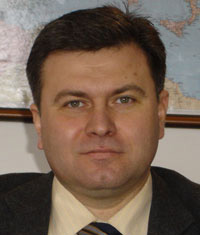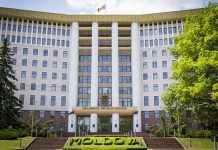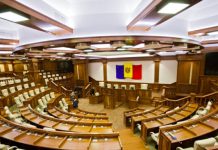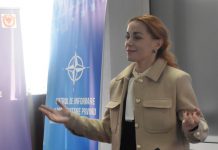A new round of informal talks on the settlement of the Transnistrian conflict in the 5+2 format (Moldova and Transnistria as conflicting sides, the OSCE, Russia and Ukraine as mediators, and the U.S. and the EU as observers) took place in Vienna on April 4-5. Despite the expectations, the parties dd not manage to reach a compromise as regards the resumption of the official talks in the 5+2 format. However, the participants came much closer to reaching such a decision. Such a development is now favored by the external context determined by the renewed Russian-U.S. and Russian-EU relations as well as by Moscow’s wish to profit from this favorable situation to score a diplomatic victory into the goal of Brussels, which has been lately passive and proposed no initiative as regards the Transnistrian dispute.
Russia’s representative to the recent consultations in Vienna suggested that the next meeting in the 5+2 format should be held in Moscow in June. We consider that such a stance is not at all accidental. On June 5, it will be a year of the signing of the Russian-German Meseberg Memorandum by German Chancellor Angela Merkel and Russian President Dmitri Medvedev. Under the memorandum, there will be set up a EU-Russia Political and Security Committee at the level of ministers, which would be headed by the EU High Representative for Foreign Affairs and Security Policy Catherine Ashton, and by Russia’s Foreign Minister Sergey Lavrov. The EU-Russia Committee is to become a forum for opinion exchange on topical international policy subjects and the security agenda, to lay down solid rules for organizing joint civil and military crisis management operations, to facilitate the exchange of opinions and draft recommendations on specific cooperation issues, including different conflicts and crisis situations that the EU and Russia should resolve in concert within multilateral cooperation formats. The Transnistrian dispute was to become a top priority in the working agenda of the EU-Russia Committee.
One year after the singing of the Meseberg Memorandum, the EU-Russia Political and Security Committee remains a project with uncertain prospects. Though Angela Merkel’s proposal was appreciated by most of the EU member states, no progress was made, mainly owing to the lack of consensus. In August 2010, Moscow sent to Brussels its proposals concerning the work and responsibilities of the future Russia-EU Committee. In a recent working meeting with Moldova’s Foreign Minister Iurie Leanca, Sergey Lavrov said that Brussels has not yet answered to Moscow’s proposals. It is known that the proposals regarding the Transnistrian conflict submitted by Moscow are based on the Kozak Memorandum. This shows that Russia does not intend to abandon this document. On the contrary, it will take all the opportunities to revive it, but only after it obtains the goodwill of important EU member states.
The creation of the EU-Russia Political and Security Committee is undoubtedly a foreign policy priority for Moscow. The existence of such a committee would allow Moscow to have a real instrument for influencing the EU’s foreign policy and security decisions, including decisions concerning the so-called close neighborhood” of Russia. Moreover, the setting up of the EU-Russia Committee will represent a tangible accomplishment on the way to building the new European security architecture announced by President Dmitry Medvedev in Berlin on June 5, 2008. In fact, the Kremlin aims to redefine the European security strategy so that Russia and its interests have a greater reflection in it.
The delay in constituting the EU-Russia Committee does not suit the Kremlin. From the statements made by Sergey Lavrov in a press briefing held jointly with Iurie Leanca, we can deduce that Moscova is frustrated by Brussels’ indecision as regards the proposal made by Angela Merkel and Dimitri Medvedev in the Meseberg Memorandum. In this connection, we do not rule out that by aiming to revive the idea of creating the EU-Russia Political and Security Committee, Moscow will make Tiraspol to accept the resumption of the formal talks in the 5+2 format.
However, the official negotiations in the 5+2 format will not be resumed gratis for us. Sergey Lavrov suggested this while Foreign Minister Iurie Leanca was in the Russian capital on a working visit. Though he stressed that Russia is now more interested in renewing the official talks as soon as possible so as to reach a political compromise and grant the Transnistrian region a special status within a territorially integral state, the Russian minister underlined that it is Chisinau and Tiraspol that must negotiate this compromise on the basis of equality of sides’ rights. It is true that Sergey Lavrov agreed to the necessity of transforming the Russian peacekeeping operation, but in the context of the settlement process, not before the resumption of the talks, as Chisinau wants. He also said that Russia is ready to pull out the rest of its troops and munitions from Transnistria, but again in the context of the settlement process. This is an extremely vague formulation that leaves room for different interpretations.
Chisinau has undoubtedly noticed these conditional approach, but preferred to ignore it even if Law No. 173 of July 22, 2005 on the main provisions concerning the special legal status of the settlements located on the left bank of the Nistru (Transnistria) is flagrantly violated. Why does Chisinau keep silent and content itself with the constructive and warm form of the statements made by Lavrov? Personally, I think that the answer to this question resides in the current favorable external context”). Lately, both the mediators and observes to the Transnistrian conflict settlement talks have spoken about a favorable external context for resuming the formal talks. But this new external conjuncture determined by the renewed Russian-U.S. and Russian și EU relations makes our diplomats and governors to be cautious in taking positions in relation to Russia on issues of major interest for Moldova.
Neither the U.S. nor the EU are disposed to risk the renewed relations with Russia for Moldova’s sake. This truth became more evident for our officials after the discussions held in Chisinau with the U.S. vice president Joseph Biden. Both Washington and Brussels support Moldova’s position that the Russian troops and munitions should be withdrawn from the Transnistrian region, that the Russian peacekeeping operation should be transformed into an international civilly-mandated one or that the EU and the U.S. should have the status of fully-fledged members of the 5+2 format. However, neither Washington nor Brussels are ready to exert additional pressure on Moscow on such issues that are not of major importance to them at the moment.
The immediate resumption of the official talks in 5+2 format is a top priority for the U.S. and the EU in the Transnistrian conflict settlement process. Thus, they urge us to create favorable conditions for convincing the representatives of Tiraspol to come to the negotiating table. But there are compromises that the Moldovan politicians can make only if they renounce their credibility and career in politics. Among these compromises is the possible abrogation of the Moldovan Parliament’s law on the main provisions concerning the special legal status of the settlements located on the left bank of the Nistru (Transnistria), for example in exchange for the cancellation by Tiraspol of the results of the referendum of September 2006 regarding the independence of Transnistria and its subsequent accession to Russia.
It is well known that Moscow and Tiraspol are dissatisfied with the above-mentioned law. Under this law, the negotiations with Transnistria are aimed at achieving the democratization and demilitarization of the region. Only after these major objectives are achieved, the negotiations will focus on the joint formulation and adoption of Moldova’s organic law on the special legal status of Transnistria. But Russia does not like such a succession and proposes its own approach that would allow it to gain full control aver the settlement process, namely the talks, the agreeing of the status and the package of guarantees and then the rest….. Consequently, both Moscow and Tiraspol are in favor of annulling the given law as an indispensable conditions for reopening the official talks and for ensuring the equality of rights of the conflicting sides – Moldova and Transnistria.
Will Chisinau resort to the abrogation of the law on the main provisions concerning the special legal status of the settlements located on the left bank of the Nistru (Transnistria)? Probably not as such an initiative would be like a suicide for any Moldovan politician and political party. Its annulment would mean, volens nolens, that Chisinau accepts the rules of the game dictated by Tiraspol. Moscow and Tiraspol realize it. We do not know if this fact is realized in the EU capitals, mainly the large and active ones.
Victor Chirila, executive director of the Foreign Policy Association







